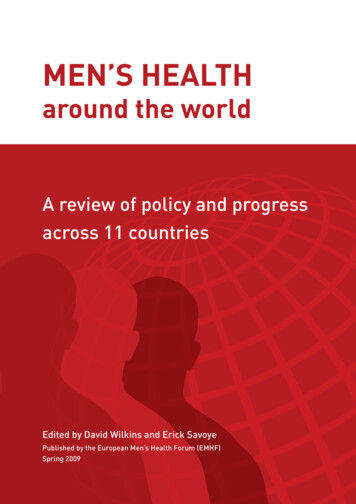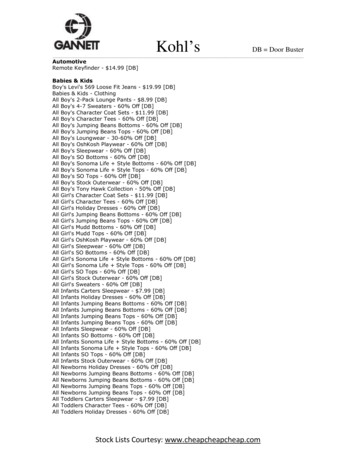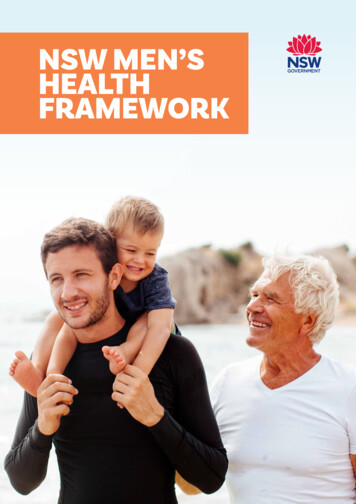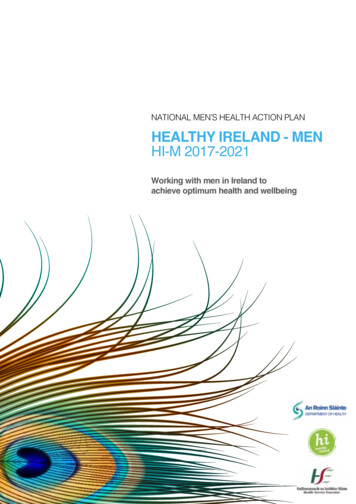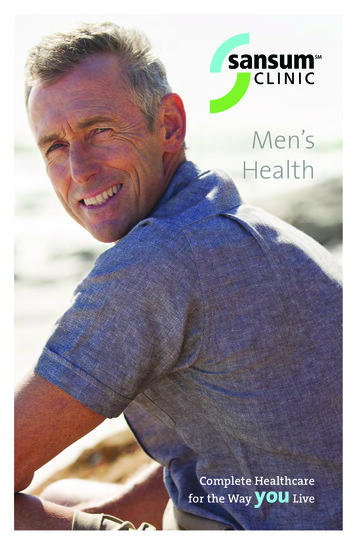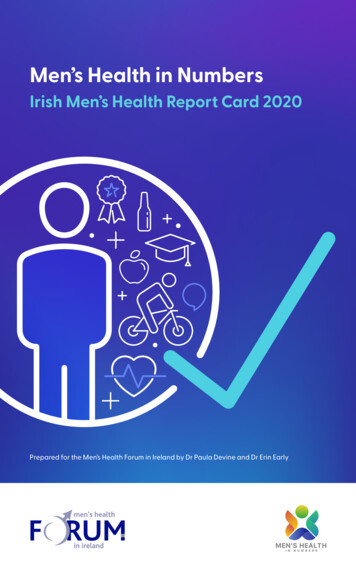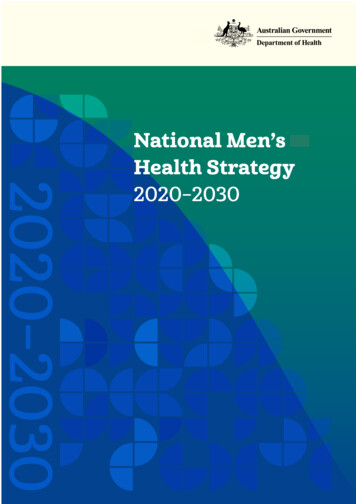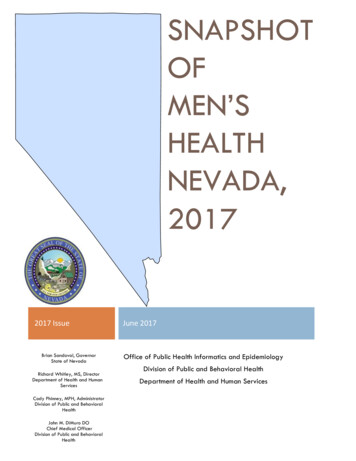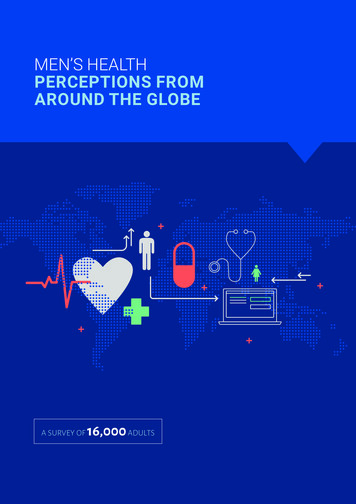
Transcription
MEN’S HEALTHPERCEPTIONS FROMAROUND THE GLOBEA SURVEY OF16,000 ADULTS1
MEN’S HEALTHPERCEPTIONSFROM AROUND THE GLOBECONTENTSForeword from Global Action on Men’s Health4Introduction6GLOBAL FINDINGSKey FindingsOpportunity for self-care810COUNTRY ted KingdomUnited States1418222630343842References46SURVEY METHODThis report is based on a survey of men and women across theworld - 2,000 adults each in 8 countries (Australia, France, Germany,Italy, Poland, Sweden, the United Kingdom and the United States) examining attitudes towards men’s health. The findings presentedare all-country averages for men unless otherwise stated.The report was commissioned by Sanofi - Consumer Health Care(CHC) in cooperation with Global Action on Men’s Health (GAMH)and its members the Men’s Health Network (MHN, US), Men’sHealth Forum (UK), Australian Men’s Health Forum (AMHF) andMen’s Health Education Council (MHEC).Survey fieldwork was conducted by Opinium Research (Australia andEU countries) and Harris Poll (US) from 31 August to 10 September2016.For a digital copy of the report, please visit: www.gamh.org23
MEN’S HEALTHPERCEPTIONSFROM AROUND THE GLOBEFOREWORDMEN’S HEALTH: AN OVERLOOKED INEQUALITYMen’s health is far worse than it need be. From a globalperspective, the gap between male and female lifeexpectancy is actually getting wider: in 1980, men’slives were, on average, four years shorter than women’s;by 2015, the difference was six years; and, by 2030, themale:female health “gap” is predicted to be seven years.This large difference is not just a problem in low-incomecountries: in 2015, men died five years sooner thanwomen in the wealthier countries too.Men also live fewer years in good health. Globally, mencan expect a “healthy life expectancy” which is threeyears below women’s. In the wealthier countries, thehealthy life expectancy gap is four years.The excess health burden facing men has many causes.The risks men take with their health, for example, bysmoking, drinking too much alcohol, eating a poor dietand driving dangerously, are compounded in manycountries by men's sub-optimal use of primary careservices. The nature of many men’s occupations, whichexposes them to a wide range of hazards, is also asignificant factor.Poor health is not inevitable for men, however. It is notgenetic in origin, except perhaps to a small degree. Wenow know enough about how to support men to takebetter care of themselves and improve the accessibilityof health services.The Global Men’s Health Survey - one of the mostcomprehensive international surveys of men’s healthpublished to date - will contribute to the momentum forchange.The findings that stand out include: The overwhelming majority of men in the countriessurveyed want to take charge of their health and fourmen in every five feel as confident as women when itcomes to managing their own health. The idea thatmen are simply hell-bent on self-destruction, reluctantto think about their health or helpless fools is exposedas a myth. Men are generally very positive about the value ofover-the-counter medicines (OTC). This bodes well forefforts to improve men’s self-care.A SYSTEMATIC APPROACH LED BY HEALTHPOLICYMAKERS AND PROVIDERS IS NOWREQUIRED AND THE DEVELOPMENTOF NATIONAL MEN’S HEALTH POLICIESWOULD BE A VERY GOOD PLACE TO START. hile Wthe survey finds that men are confident inmanaging their own health, their actual use ofpharmacy services is still at a low level. Pharmacieshave huge potential as a resource for men’s health andmen’s health and pharmacy organisations can worktogether to make them a service many more men willwant to use. T hereis significant under-use of digital healthservices by men. When faced with a health problem,surprisingly few men’s first response would be togo online to look up their symptoms and possibletreatments. There is huge potential for improvementthrough reputable websites, social media and apps,especially delivered via mobile platforms. en Mremain reluctant to seek help for a range ofsexual health problems and are still deterred byembarrassment and a belief that the problem willgo away on its own. Improving men’s knowledge,confidence and ability to access services for sexualhealth issues is of critical importance.Global Action on Men’s Health welcomes this new report.It offers important new insights, based on a very largerepresentative sample of men and women across eightcountries. It will contribute to the growing awarenessand debate about the overlooked inequality that ismen’s health and, most importantly, to new initiatives toimprove the length and quality of their lives.PETER BAKERDirector, Global Action on Men’s Healthwww.gamh.org45
INTRODUCTIONThe survey - Men’s Health: Perceptions from Around the Globe - is one of the largest globalsurveys ever undertaken to explore men’s perceptions of their state of health. The findingsindicate significant opportunities for policymakers and providers around the world whoare looking for ways to improve men’s health and well-being and address related healthinequalities and burdens.One of the key ways in which men can take charge of their own health is through self-care.Self-care is what people do for themselves to establish and maintain health, prevent anddeal with illness. This is a broad concept and encompasses hygiene, nutrition, and lifestyle.It is the ability of individuals, families and communities to cope with health conditions withor without the support of a healthcare provider. This report provides important insights inmen’s perception of their own state of health and how they intend to better manage theirhealth, including many of these elements of self-care.GLOBALFINDINGSThis report is being published to coincide with International Men’s Day on 19 November2016. The survey was designed to find out more about men’s perception of healthcare.67
KEY FINDINGS87%MEN WANT TO TAKE GREATER CONTROL OF THEIR OWN HEALTH AND WELL-BEING. THISCOULD ENABLE THEM TO NARROW THE LIFE EXPECTANCY GENDER GAP. WHILE MOST MENFEEL HEALTHY, PRIOR RESEARCH SHOWS THAT MEN IN DEVELOPED COUNTRIES LIVE ONAVERAGE 6 YEARS LESS THAN WOMEN.1THESE SURVEY RESULTS FIND THAT WHILE MEN FEEL CONFIDENT IN MANAGING THEIRHEALTH, THERE IS A DISPARITY BETWEEN THIS BELIEF AND THE WAY THEY TEND TO DO IT.of men want to takecharge of their healthAND6/7men are confident in managing theirown health.THE ENTHUSIASM MEN SHOW FOR TAKING A MORE ACTIVE ROLE IN THEIR HEALTH AND WELLBEING COULD BE A SIGNIFICANT OPPORTUNITY, PARTICULARLY IF MEN ARE SUPPORTED ANDEMPOWERED.MEN BELIEVE THAT THEY ARE IN GOOD HEALTH83%Feeling healthyWHERE DO MEN RATE THEIR HEALTHAS GOOD OR VERY GOOD?88% USA85% Australia85% France84% Sweden83% Italy82% UK81% Germany79% PolandTHE DISPARITY BETWEEN BELIEFS AND ACTIONSTHE SURVEY FINDINGS CONFIRM THAT THERE IS A CONTRADICTION BETWEEN MEN’SPERCEPTIONS OF HOW THEY MANAGE THEIR HEALTH AND THEIR ACTUAL BEHAVIOUR.WHILE THE SURVEY SHOWS THAT MEN ARE CONFIDENT MANAGING THEIR OWN HEALTH,THEY ARE NOT TAKING ADVANTAGE OF SOURCES OF INFORMATION AND ADVICE THAT THEYTRUST. THIS CONTRADICTION COULD WELL BE AT THE ROOT OF THE GENDER HEALTH GAPAND NEEDS TO BE ADDRESSED.A DESIRE TO TAKE CONTROLMen understand what constitutes good health andwell-being. Key areas men want to improve include:The good news emerging fromthe survey findings is that a large majorityof men want to take charge of their ownhealth, and feel confident in being able todo so. Men have a well-rounded view of whatconstitutes good health, looking to addressissues such as fitness, energy levels, diet,stress, and sexual 74%69%73%84%73%71%58%54%76%72%52%63%76%65%Whereas 49% of men citeseeing their doctor as their mostlikely response when feelingunwell or discovering a non-lifethreatening medical problem,Whereas 4% of men aremost likely to turn to apharmacist when feelingunwell or discovering a non-lifethreatening medical problem,76% believe that there aremedical conditions for whichobtaining the appropriatemedication should not requirea visit to the doctor.80% of men said that lessserious conditions can be dealtwith by a pharmacist ratherthan by a doctor.*Whereas 17% of men saythey’re most likely to lookup symptoms and possibletreatments online when feelingunwell or discovering a non-lifethreatening medical problem,55% of men agree there isplentiful information onlineto help them choose the rightmedication.IT’S CLEAR FROM THE DATA THAT WHILE MEN ARE INTERESTED IN OVER-THE-COUNTER (OTC)MEDICATION, TRUST THEIR PHARMACISTS, AND AGREE THAT THERE IS PLENTY OF HEALTHINFORMATION ONLINE, THERE IS ROOM FOR MUCH GREATER USE OF THESE RESOURCES.* 59% of men feel comfortable using OTC for headaches or migraines, 43% for allergies, and 37% for nausea.89
Men’s desirsuggests e to take controlthplay a m at self-care canore significain men’shealth. In nt rolefact, thesurvey shows that men amore corenfitheir hea dent managinglth (85%)tthey aremanagin hangtlevel of work stres heirs (65%)or career decisions (67%).THE OPPORTUNITY FOR SELF-CAREHOW CONFIDENT DO MEN FEEL IN MANAGING PARTS OF THEIR LIFE?78%86%86%89%85%Managing household finances90%87%91%79%87%89%90%87%88%Managing level of work-related stress68%59%66%67%60%70%61%70%65%Managing level of non-work-related stress83%70%78%74%63%76%79%85%76%Making career CARE IS WHAT PEOPLE DO FOR THEMSELVESto establish and maintain health, prevent and deal with illness. Thisis a broad concept and encompasses hygiene, nutrition, lifestyle,environmental factors, and socio-economic factors. It is the abilityof individuals, families and communities to cope with healthconditions with or without the support of a healthcare provider.2Lifestyle47% When needing a regular check-up / get invited in for a health check or screening40% When they need antibiotics or prescription medication32% When they have a question relating to their health24% When their doctor tells them to come in10% When their children are ill4% They do not go to their doctor at allUSSwedendanPolItamceGerFrantraAusHygiene63% When feeling ill or have an injuryAverage82%UK82%ly87%any89%liaManaging healthAS DEMONSTRATED ABOVE,DOCTORS ARE CURRENTLY THE FIRST PORT OF CALL FOR MEN WHEN THEY FEEL UNWELL.BUT, WHEN EXACTLY DO MEN GO TO SEE THEIR AAverageONLINE INFORMATIONIS CURRENTLY THE SECOND MOST LIKELYRESPONSE FOR MEN WHEN THEY FEEL UNWELL.The table here shows the breakdown by age for menbelieving there is plentiful information online to helpthem choose the right medication:18-3435-5455-64 6%52%51%50%62%44%56%38%43%45%57%59%64%70%WHEN MEN FEEL UNWELL OR DISCOVER A NON-LIFE THREATENING MEDICAL PROBLEM,WHERE DO THEY TURN?52%63%32%39%27%49%See a pharmacist3%6%2%3%2%2%6%5%4%Buy a form of over-the-counter medication3%3%4%2%6%3%4%9%4%Ask a friend or family member for %57%59%52% nSee my doctorTHE LEVEL OF TRUSTIN OVER-THE-COUNTERMEDICATIONS,compared to medicinesprescribed by a doctor,varies by age and erm14%Fran14%liaLook up my symptoms and treatments online11
FOR MEN THAT CITED AN INCREASED USE OF OVER THE COUNTER MEDICATION,WHAT WERE THE CAUSES?THE TABLE BELOW PROVIDES AN OVERVIEW OF DIFFERENT SEXUAL HEALTH CONDITIONS FOR WHICHMEN CITED “DO NOTHING” AS THEIR RESPONSE WHEN THE CONDITION ARISES:32% Poor health;they have had more ailments to treat29% They trust my pharmacist to make over-the-counter recommendations to treat their ailment/s1%1%2%19% They find that over-the-counter treatments costs less than prescription medicationIrritation or infection4%15%6%5%4%9%4%7%7%18% Difficulty of getting a doctor appointment; they try over-the-counter medication as a first line treatmentErectile dysfunction33%43%41%30%33%43%30%47%38%18% The cost of seeing a doctor; they try over-the-counter as a first line treatmentLoss of libido38%60%44%41%34%53%54%41%46%Pain during sex/painful sex19%44%30%38%30%42%35%14%32%32%OF MEN CONSIDER SEXUAL HEALTHTO BE ONE OF THE MOST IMPORTANTPARTS OF THEIR OVERALL HEALTHAND WELL-BEING.32%OF MEN ARE DISSATISFIED WITH THESERVICES AND ACCESS AVAILABLE FORSENSITIVE TOPICS LIKE SEXUAL HEALTH INTHEIR CURRENT HEALTH SYSTEMS.WHERE DO MEN FEEL THAT HEALTH SERVICES ARE NOT CURRENTLY MEETING THEIRNEEDS FOR SENSITIVE HEALTH ISSUES LIKE SEXUAL HEALTH?AUSTRALIA FRANCE GERMANY32%33%28%ITALY POLAND40%44%SWEDEN29%UK US23% %ce60%liaWomenAusWomen, more thanmen, want to improvetheir fitness, diet andstress.*BUTWhile a huge majority of men take action when facing problems like sexually transmitted diseases (98%) orirritation and infections (93%), significantly fewer men take action when it comes to conditions like loss of libido(54%), erectile dysfunction (62%), or pain during sex (68%).THIS IS THE CASE EVEN THOUGH BOTH MEN (77%) AND WOMEN (66%) BELIEVE THAT HAVING AHEALTHY SEXUAL RELATIONSHIP IS CRITICAL TO THEIR HAPPINESS.BAD HABITS AND SEXUAL WELL-BEINGARE IMPORTANT AREAS FOR IMPROVEMENTMen, more thanwomen, want to cutbad habits and improvesexual performance.*SwedEDUCATING AND EMPOWERING MEN TO TAKE CONTROL OF THEIR HEALTH HAS ENORMOUSPOTENTIAL TO PREVENT ILLNESS AND IMPROVE HEALTH AND WELLBEING. HEALTHPROBLEMS LINKED TO MEN’S LACK OF HEALTH LITERACY AND LOWER ACCESS TO PRIMARYCARE SERVICES COULD BE PREVENTED BY INCREASING MEN’S UNDERSTANDING3 OF THERANGE OF FACTORS THAT IMPACT THEIR HEALTH AND THEIR ABILITY TO COPE WITH HEALTHCONDITIONS WITH OR WITHOUT THE SUPPORT OF A HEALTHCARE PROVIDER.3Pol13% Other AustraliaSexually transmitted diseases26% Seeing a pharmacist is more convenient than seeing a doctorThis survey shows there is a significant opportunity to capitalise on men’senthusiasm to take greater control of their health and well-being.Men want to do more and so should be empowered to do so.The role that self-care can play in enabling men to take greater controland improving their health should be further explored. Self-care couldallow men to treat diseases, injuries and health conditions, while alsogiving them the opportunity to prevent future health problems, reduceailments and increase quality of life. Through greater health literacy andbetter understanding of the benefit of lifestyle modification men can beempowered to take better control of their health.* Men versus women, respectively: bad habits (49%, 43%) , sexual performance (60%, 41%), fitness (83%, 87%), diet (73%, 77%), stress (65%, 71%).1213
WHEN IT COMES TO MONITORING THEIR HEALTH:88%Public Perception inAUSTRALIAKEY FINDINGSMore than 2,000 adults took part in the survey.Results are weighted to be nationally representative of age and gender.of Australian men areconfident in identifyingproblems when they ariseAND92%believe they know whichhealthcare professionalthey should turn to whensomething is wrong.AUSTRALIAN MEN 65 YEARS MOST CONFIDENTin managing their health and in identifying health problems.AUSTRALIAN MEN BELIEVE THAT THEY ARE IN GOOD HEALTH100%0%Feeling healthy85%MEN AGED 18-34 (81%) ARE THE MOST LIKELY TO BE SATISFIED WITH THEIR STATE OFHEALTH, WHILE MEN AGED 55-64 ARE THE LEAST SATISFIED (75%).AUSTRALIAN MEN ARE WELL ABOVETHE AVERAGE IN WANTING TOIMPROVE KEY AREAS OF THEIR %Average83%78%73%65%THE DISPARITY BETWEEN BELIEFS AND ACTIONSA DESIRE TO TAKE CONTROLAUSTRALIAN MEN ARE EXTREMELYCONFIDENT ABOUT MANAGINGTHEIR OWN HEALTH.86%89%of Australian menwant to take charge of their healthof Australian menare confident managing their own healthWhereas 62% of men citeseeing their doctor as their mostlikely response when feelingunwell or discovering a non-lifethreatening medical problem,Whereas 3% of men aremost likely to turn to apharmacist when feelingunwell or discovering a non-lifethreatening medical problem,76% believe that there aremedical conditions for whichobtaining the appropriatemedication should not requirea visit to the doctor.82% of men said that lessserious conditions can be dealtwith by a pharmacist ratherthan by a doctor.*Whereas 14% of men saythey’re most likely to lookup symptoms and possibletreatments online when feelingunwell or discovering a non-lifethreatening medical problem,56% of men agree there isplentiful information onlineto help them choose the rightmedication.* 67% of Australian men feel comfortable using OTC for headaches or migraines, 59% for allergies, and 42% for nausea.1415
AustraliaAustraliaTHE OPPORTUNITY FOR SELF-CAREAUSTRALIAN MEN ARE MORE CONFIDENT MANAGING THEIR HEALTH (89%) THAN THEY AREMANAGING THEIR LEVEL OF WORK STRESS (68%) OR CAREER DECISIONS (69%).30%?When men in Australiafeel unwell or discovera non-life threateningmedical problem, theyare likely to:Australian men's likelyresponse when they feelunwell or discover a non-lifethreatening medical problemvaries by age:77%1662%5%14%See a doctorLook up symptomsand treatmentsonlineAsk a friendor family memberfor advice18-3435-5455-64 65See a doctor42%54%72%83%Look up symptoms online21%18%9%6%of Australian men believethat over-the-countermedication works wellAND84%BAD HABITS AND SEXUAL WELL-BEINGARE IMPORTANT AREAS FOR IMPROVEMENTOF AUSTRALIAN MEN CONSIDER SEXUAL HEALTH TO BE ONE OF THE MOSTIMPORTANT PARTS OF THEIR OVERALL HEALTH AND WELL-BEING.WHILE A HUGE MAJORITY OF AUSTRALIAN MENTAKE ACTION WHEN FACING PROBLEMS likesexually transmitted diseases (98%) or irritation andinfections (96%), far fewer men take action when itcomes to conditions like loss of libido (62%), erectiledysfunction (67%), or pain during sex (81%).BUTBoth men (72%) and women (60%) believe thathaving a healthy sexual relationship is critical to theirhappiness.of Australian menfeel that the productscurrently availableaddress their overallhealth needs.17
Public Perception inFRANCEMore than 2,000 adults took part in the survey.Results are weighted to be nationally representative of age and gender.FRENCH MEN ARE WELL BELOWTHE SURVEY AVERAGE IN WANTING TOIMPROVE KEY AREAS OF THEIR erage83%78%73%65%KEY FINDINGSTHE DISPARITY BETWEEN BELIEFS AND ACTIONSMEN BELIEVE THAT THEY ARE IN GOOD HEALTH100%0%AS FOR OTHER COUNTRIES SURVEYED, THE SURVEY SHOWS THAT WHILE FRENCH MEN ARECONFIDENT AND TRUST HEALTHCARE PROVIDERS, THEY ARE NOT TAKING ADVANTAGE OFSOURCES OF INFORMATION AND ADVICE THAT THEY TRUST.Feeling healthy85%A DESIRE TO TAKE CONTROL6/7AS IN THE OTHER COUNTRIESSURVEYED, FRENCH MENOVERWHELMINGLY WANT TO TAKECHARGE OF THEIR OWN HEALTH.6 in 7 French men both want to take charge of their healthWHEN IT COMES TO MONITORING THEIR HEALTH:81%of French men are confidentin identifying problemswhen they ariseAND88%believe they know whichhealthcare professionalthey should turn to whensomething is wrong.FRENCH MEN 65 YEARS MOST CONFIDENTin managing their health and in identifying health problems.Whereas 53% of men citeseeing their doctor as their mostlikely response when feelingunwell or discovering a non-lifethreatening medical problem,Whereas 6% of men aremost likely to turn to apharmacist when feelingunwell or discovering a non-lifethreatening medical problem,60% believe that there aremedical conditions for whichobtaining the appropriatemedication should not requirea visit to the doctor.78% of men said that lessserious conditions can be dealtwith by a pharmacist ratherthan by a doctor.*At only 38%, French men are well below the averageof 54% in agreeing that there is plentiful informationonline to help them choose the right treatments. Thisdisparity could in part be due to the attitudes of youngmen in France towards online medical information,Whereas 14% of men saythey’re most likely to lookup symptoms and possibletreatments online when feelingunwell or discovering a non-lifethreatening medical problem,38% of men agree there isplentiful information onlineto help them choose the rightmedication.where only 53% of French men in the 18-34 year oldcategory agree with the statement, as compared withthe 79% of 18-34 year old men in the UK who believe thatthere is plentiful information online.* 57% of French men feel comfortable using OTC for headaches or migraines, 32% for allergies, and 32% for nausea.1819
FranceFranceTHE OPPORTUNITY FOR SELF-CAREFRENCH MEN ARE MORE CONFIDENT MANAGING THEIR HEALTH (87%) THAN THEY AREMANAGING THEIR LEVEL OF WORK STRESS (59%) OR CAREER DECISIONS (63%).?When men feel unwellor discover a non-lifethreatening medicalproblem, they are likelyto turn to a variety ofplaces for support:53%See a doctor14%Look up symptomsand treatmentsonline5%Ask a friendor family memberfor adviceBAD HABITS AND SEXUAL WELL-BEINGARE IMPORTANT AREAS FOR IMPROVEMENT29%OF FRENCH MEN CONSIDER SEXUALHEALTH TO BE ONE OF THE MOSTIMPORTANT PARTS OF THEIR OVERALLHEALTH AND WELL-BEING.WHILE A HUGE MAJORITY OF FRENCH MEN TAKEACTION WHEN FACING PROBLEMS like sexuallytransmitted diseases (93%) or irritation and infections(85%), far fewer men take action when it comes toconditions like loss of libido (40%), erectile dysfunction(57%), or pain during sex (56%).33%OF FRENCH MEN ARE DISSATISFIED WITHTHE SERVICES AND ACCESS AVAILABLE FORSENSITIVE TOPICS LIKE SEXUAL HEALTH INTHEIR CURRENT HEALTH SYSTEMS.BUTBoth men (82%) and women (70%) believe thathaving a healthy sexual relationship is critical to theirhappiness.MEN IN FRANCE TRUST IMPORTANT ELEMENTS OF SELF-CARE, HAVING HIGH LEVELS OFTRUST IN PHARMACIES AND PHARMACISTS COMPARED TO OTHER COUNTRIES IN THE EU.81%20of French men feel satisfiedthat currently availablehealth products addresstheir health needs.62%of French men feel that buyingOTC medication means they cantreat themselves for conditionsthey’ve had previously or for a longperiod of time.21
79%of German men areconfident about identifyinghealth problems when theyariseAND88%of German men believethey know whichhealthcare professionalthey should turn to whensomething is wrong.Public Perception inGERMANYKEY FINDINGSMore than 2,000 adults took part in the survey.Results are weighted to be nationally representative of age and gender.GERMAN MEN ARE WELL BELOW THESURVEY AVERAGE IN WANTING TOIMPROVE KEY AREAS OF THEIR HEALTH:GERMAN MEN BELIEVE THAT THEY ARE IN GOOD HEALTH100%0%MEN IN GERMANY (54%)ARE LESS INTERESTED INREDUCING STRESS THAN INOTHER COUNTRIES, SUCH ASITALY (76%) AND POLAND (72%).Feeling 4%Average83%78%73%65%70%OF GERMAN MEN (74%) RANKED GETTING ENOUGHSLEEP AS THE MOST IMPORTANT ELEMENT OFTHEIR OVERALL HEALTH AND WELLNESS, THEHIGHEST LEVEL IN EUROPE.94% OF YOUNGER GERMAN MEN (AGED 18 TO 34) BELIEVE THAT THEY ARE IN GOOD HEALTHTHE DISPARITY BETWEEN BELIEFS AND ACTIONSA DESIRE TO TAKE CONTROL84%of German men want to takecharge of their healthAND82%are confident inmanaging their ownhealth.YOUNG MEN AGED 18 TO 34 IN GERMANY ARE THE MOST CONFIDENT IN MANAGING THEIRHEALTH (87%), MEN OVER AGE 55 ARE THE LEAST CONFIDENT (76%).Whereas 63% of men citeseeing their doctor as their mostlikely response when feelingunwell or discovering a non-lifethreatening medical problem,Whereas 2% of men aremost likely to turn to apharmacist when feelingunwell or discovering a non-lifethreatening medical problem,80% believe that there aremedical conditions for whichobtaining the appropriatemedication should not requirea visit to the doctor.59% of men said that lessserious conditions can be dealtwith by a pharmacist ratherthan by a doctor.*Whereas 15% of men saythey’re most likely to lookup symptoms and possibletreatments online when feelingunwell or discovering a non-lifethreatening medical problem,43% of men agree there isplentiful information onlineto help them choose the rightmedication.* 50% of German men feel comfortable using OTC for headaches or migraines, 23% for allergies, and 31% for nausea.2223
GermanyGermanyTHE OPPORTUNITY FOR SELF-CAREGERMAN MEN ARE MORE CONFIDENT MANAGING THEIR HEALTH (82%) THAN THEY AREMANAGING THEIR LEVEL OF WORK STRESS (66%) OR CAREER DECISIONS (67%).34%?When men in Germanyfeel unwell or discovera non-life threateningmedical problem, theyare likely to:63%See a doctorGerman men’s likely responsewhen they feel unwell ordiscover a non-life threateningmedical problem varies by age:Look up symptomsand treatmentsonlineAsk a friendor family memberfor advice18-3435-5455-64 65See a doctor43%62%68%75%Look up symptoms online26%15%13%9%54%63%WHILE A HUGE MAJORITY OF GERMAN MEN TAKEACTION WHEN FACING PROBLEMS like sexuallytransmitted diseases (95%) or irritation and infections(94%), far fewer men take action when it comes toconditions like loss of libido (56%), erectile dysfunction(59%), or pain during sex (70%).28%OF GERMAN MEN ARE DISSATISFIED WITHTHE SERVICES AND ACCESS AVAILABLE FORSENSITIVE TOPICS LIKE SEXUAL HEALTH INTHEIR CURRENT HEALTH SYSTEMS.BUTBoth men (74%) and women (61%) believe thathaving a healthy sexual relationship is critical to theirhappiness.of German men trust over-the-counter medications as much as thoseprescribed by a doctor82%of German men feel that the products currently availableaddress their overall health needsof German men said that buying over-the-counter medication savedthem time, as they did not have to make a doctor’s appointment.24OF GERMAN MEN CONSIDER SEXUALHEALTH TO BE ONE OF THE MOSTIMPORTANT PARTS OF THEIR OVERALLHEALTH AND WELL-BEING.5%15%BAD HABITS AND SEXUAL WELL-BEINGARE IMPORTANT AREAS FOR IMPROVEMENT61%of German men found over-the-countermedication much more convenient thanhaving to see a doctor.25
Public Perception inITALYMore than 2,000 Italian adults took part in the survey.Results are weighted to be nationally representative of age and gender.KEY FINDINGSITALIAN MEN ARE ABOVE THE AVERAGEIN WANTING TO IMPROVE KEY AREAS OFTHEIR rage83%78%73%65%ITALIAN MEN BELIEVE THAT THEY ARE IN GOOD HEALTH0%100%THE DISPARITY BETWEEN BELIEFS AND ACTIONSFeeling healthy83%AS FOR OTHER COUNTRIES SURVEYED, THE SURVEY SHOWS THAT WHILE ITALIAN MEN ARECONFIDENT AND TRUST HEALTHCARE PROVIDERS, THEY ARE NOT TAKING ADVANTAGE OFSOURCES OF INFORMATION AND ADVICE THAT THEY TRUST.A DESIRE TO TAKE CONTROLTHEHIGHESTIN THESURVEYWhile all age groups feel healthy, there is a markeddifference between over 40s and under 40s:10% of men under 40 say they are in poor healthversus 20% of those over 40.78%of Italian men are confidentin identifying problemswhen they ariseAND94% of men in Italy want to takecharge of their own health.83%believe they know whichhealthcare professionalthey should turn to whensomething is wrong.Whereas 52% of men citeseeing their doctor as their mostlikely response when feelingunwell or discovering a non-lifethreatening medical problem,Whereas 3% of men aremost likely to turn to apharmacist when feelingunwell or discovering a non-lifethreatening medical problem,69% believe that there aremedical conditions for whichobtaining the appropriatemedication should not requirea visit to the doctor.70% of men said that lessserious conditions can be dealtwith by a pharmacist ratherthan by a doctor.*Whereas 14% of men saythey’re most likely to lookup symptoms and possibletreatments online when feelingunwell or discovering a non-lifethreatening medical problem,45% of men agree there isplentiful information onlineto help them choose the rightmedication.* 55% of Italian men feel comfortable using OTC for headaches or migraines, 26% for allergies, and 33% for nausea.2627
ItalyItalyTHE OPPORTUNITY FOR SELF-CAREITALIAN MEN ARE MORE CONFIDENT MANAGING THEIR HEALTH (82%) THAN THEY AREMANAGING THEIR LEVEL OF WORK STRESS (67%) OR CAREER DECISIONS (75%).?When men in Italy feelunwell or discover anon-life threateningmedical problem, theyare likely to:52%14%See a doctor65%Look up symptomsand treatmentsonlineof Italian men agree that using over-thecounter medication can save them timewhen compared with visiting a doctor.WHILE A HUGE MAJORITY OF ITALIAN MENTAKE ACTION WHEN FACING PROBLEMS likesexually transmitted diseases (100%) or irritation andinfections (95%), far fewer men take action when itcomes to conditions like loss of libido (59%), erectiledysfunction (70%), or pain during sex (62%).BUTBoth men (88%) and women (77%) believe thathaving a healthy sexual relationship is critical to theirhappiness, the highest in the survey for both men andwomen.4%Ask a friendor family memberfor advice64%of Italian men believe over-the-countermedication leaves more time for doctors todeal with more serious conditions.BAD HABITS AND SEXUAL WELL-BEINGARE IMPORTANT AREAS FOR IMPROVEMENT33%OF ITALIAN MEN CONSIDER SEXUALHEALTH TO BE ONE OF THE MOSTIMPORTANT PARTS OF THEIR OVERALLHEALTH AND WELL-BEING.2840%OF ITALIAN MEN ARE DISSATISFIED WITHTHE SERVICES AND ACCESS AVAILABLE FORSENSITIVE TOPICS LIKE SEXUAL HEALTH INTHEIR CURRENT HEALTH SYSTEMS.29
Public Perception inPOLANDMore than 2,000 Polish adults took part in the survey.Results are weighted to be nationally representative of age and gender.POLISH MEN ARE ABOVE THE SURVEYAVERAGE IN WANTING TO IMPROVEKEY AREAS OF THEIR HEALTH:KEY verage83%78%73%65%POLISH MEN BELIEVE THAT THEY ARE IN GOOD HEALTHTHE DISPARITY BETWEEN BELIEFS AND ACTIONS100%0%Feeling healthy79%AS FOR OTHER COUNTRIES SURVEYED, THE SURVEY SHOWS THAT WHILE POLISH MEN ARECONFIDENT AND TRUST
men’s health perceptions from around the globe men’s health: an overlooked inequality peter baker director, global action on men’s health www.gamh.org a systematic approach led by health policymakers and providers is now required and the development of national men’s heal
